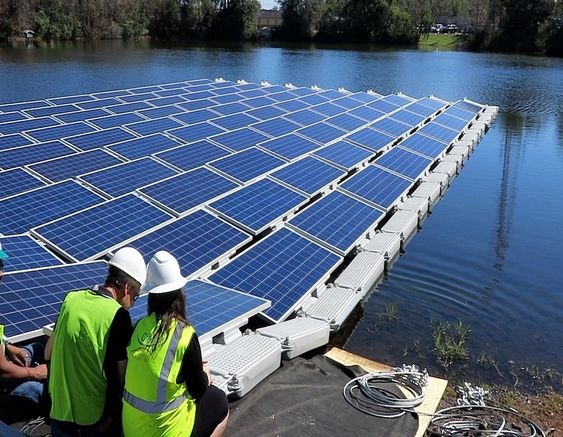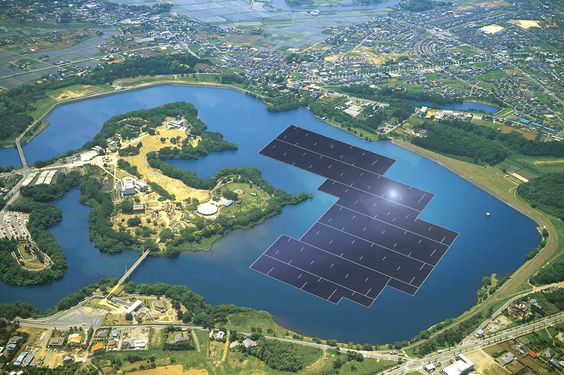Home Solar Energy
Are Floating Solar Farms Better Than Land-based Ones?

Are Floating Solar Farms Better Than Land-based Ones?
What are Floating Solar Farms?
A floating solar farm is a photovoltaic (PV) system that is mounted on a floating platform on the surface of a body of water, such as a reservoir, lake, or ocean. Floating solar farms have several advantages over traditional ground-mounted solar farms, including:
- Increased efficiency: Solar panels that are mounted on water are cooler than those that are mounted on land, which makes them more efficient.
- Reduced evaporation: Floating solar panels can help to reduce evaporation from water bodies, which is especially important in areas that are prone to drought.
- Reduced land use: Floating solar farms do not require any land, which means that they can be installed in areas where land is scarce or expensive.
- Improved water quality: Floating solar panels can help to improve water quality by shading the water and reducing the growth of algae.
Floating solar farms are a relatively new technology, but they are growing rapidly in popularity. In 2022, the global installed capacity of floating solar farms was over 13 gigawatts, and this is expected to grow to over 50 gigawatts by 2025.
Here are some of the largest floating solar farms in the world:
- Omkareshwar Dam Floating Solar Power Plant (India): 600 megawatts
- Tengeh Reservoir Floating Solar Farm (Singapore): 101 megawatts
- Hythe Reservoir Floating Solar Farm (United Kingdom): 95 megawatts
- Anhui Province Floating Solar Farm (China): 81.5 megawatts
- Polder Stenenhoek Floating Solar Farm (Netherlands): 73.3 megawatts
Floating solar farms are a promising technology with the potential to play a major role in the transition to clean energy.
Pros And Cons Of Floating Solar Farms
Pros of floating solar farms:
- Increased efficiency: Solar panels that are mounted on water are cooler than those that are mounted on land, which makes them more efficient. This is because water acts as a heatsink, helping to dissipate the heat generated by the solar panels.
- Reduced evaporation: Floating solar panels can help to reduce evaporation from water bodies, which is especially important in areas that are prone to drought. The panels act as a barrier between the sun and the water, reducing the amount of heat that is absorbed by the water and preventing it from evaporating.
- Reduced land use: Floating solar farms do not require any land, which means that they can be installed in areas where land is scarce or expensive. This can be a major advantage in densely populated areas or areas with valuable agricultural land.
- Improved water quality: Floating solar panels can help to improve water quality by shading the water and reducing the growth of algae. Algae blooms can deplete oxygen levels in the water and harm aquatic life. By shading the water, floating solar panels can help to prevent algae blooms from occurring.
- Reduced noise pollution: Floating solar farms are much quieter than traditional ground-mounted solar farms. This is because the water helps to absorb sound waves.
- Increased biodiversity: Floating solar farms can help to increase biodiversity in water bodies by providing a habitat for fish and other aquatic life. The panels create shade and structure in the water, which can attract fish and other aquatic animals.
Cons of floating solar farms:
- Higher installation costs: Floating solar farms are more expensive to install than traditional ground-mounted solar farms. This is because the floating platforms and mounting systems are more complex and expensive to manufacture and install.
- Higher maintenance costs: Floating solar farms may have higher maintenance costs than traditional ground-mounted solar farms. This is because the panels are exposed to the elements and may need to be cleaned or repaired more frequently.
- Potential environmental impacts: There is some concern that floating solar farms could have negative environmental impacts, such as disrupting the migration of birds or harming aquatic life. However, more research is needed to determine the full extent of any potential environmental impacts.
Overall, floating solar farms have some advantages over traditional ground-mounted solar farms. They are more efficient, reduce evaporation, improve water quality, and do not require any land. However, they are also more expensive to install and maintain. More research is needed to determine the full extent of any potential environmental impacts.
Despite the challenges, floating solar is a promising technology with the potential to play a major role in the transition to clean energy.
Difference Between Floating Solar Farms And Land-based Ones?
Floating solar farms and land-based solar farms are both photovoltaic (PV) systems that generate electricity from sunlight. However, there are some key differences between the two technologies.
| Feature | Floating solar farms | Land-based solar farms |
|---|---|---|
| Location | Water | Land |
| Installation cost | Higher | Lower |
| Maintenance cost | Higher | Lower |
| Environmental impact | Potential negative impacts | Less potential negative impacts |
| Efficiency | Higher | Lower |
| Land use | Lower | Higher |
| Evaporation reduction | Yes | No |
| Water quality improvement | Yes | No |
| Biodiversity impact | Potential positive impacts | Potential negative impacts |
Here is a more detailed comparison of the two technologies:
Installation cost
Floating solar farms are more expensive to install than land-based solar farms. This is because the floating platforms and mounting systems are more complex and expensive to manufacture and install.
Maintenance cost
Floating solar farms may have higher maintenance costs than traditional ground-mounted solar farms. This is because the panels are exposed to the elements and may need to be cleaned or repaired more frequently. However, the maintenance costs of floating solar farms have been decreasing in recent years, as the technology has matured.
Environmental impact
There is some concern that floating solar farms could have negative environmental impacts, such as disrupting the migration of birds or harming aquatic life. However, more research is needed to determine the full extent of any potential environmental impacts.
Efficiency
Floating solar farms are more efficient than land-based solar farms. This is because the water acts as a heatsink, helping to dissipate the heat generated by the solar panels. Cooler solar panels are more efficient.
Land use
Floating solar farms do not require any land, while land-based solar farms require land to be cleared and leveled. This makes floating solar farms a good option for areas where land is scarce or expensive.
Evaporation reduction
Floating solar panels can help to reduce evaporation from water bodies. This is because the panels act as a barrier between the sun and the water, reducing the amount of heat that is absorbed by the water and preventing it from evaporating.
Water quality improvement
Floating solar panels can help to improve water quality by shading the water and reducing the growth of algae. Algae blooms can deplete oxygen levels in the water and harm aquatic life. By shading the water, floating solar panels can help to prevent algae blooms from occurring.
Biodiversity impact
Floating solar farms can help to increase biodiversity in water bodies by providing a habitat for fish and other aquatic life. The panels create shade and structure in the water, which can attract fish and other aquatic animals. However, there is also some concern that floating solar farms could disrupt the migration of birds. More research is needed to determine the full extent of any potential impacts on biodiversity.
Overall, floating solar farms and land-based solar farms both have their advantages and disadvantages. The best technology for a particular location will depend on a variety of factors, such as the availability of land, the cost of installation and maintenance, and the potential environmental impacts.
Are Floating Solar Farms Better Than Land-based Ones?
Whether floating solar farms are better than land-based ones depends on some factors, including the specific location and the needs of the energy users.
In terms of efficiency, floating solar farms are generally considered to be better than land-based solar farms. This is because the water acts as a heatsink, helping to keep the solar panels cool. Cooler solar panels are more efficient.
Floating solar farms can also help to reduce evaporation from water bodies, improve water quality, and increase biodiversity. However, they can also be more expensive to install and maintain than land-based solar farms.
Overall, floating solar farms are a promising technology with several advantages over traditional ground-mounted solar farms. However, they are not a perfect solution, and the best technology for a particular location will depend on a variety of factors.
Here is a table that summarizes the key advantages and disadvantages of floating solar farms and land-based solar farms:
| Feature | Floating solar farms | Land-based solar farms |
|---|---|---|
| Efficiency | Higher | Lower |
| Land use | Lower | Higher |
| Evaporation reduction | Yes | No |
| Water quality improvement | Yes | No |
| Biodiversity impact | Potential positive impacts | Potential negative impacts |
| Installation cost | Higher | Lower |
| Maintenance cost | Higher | Lower |
In general, floating solar farms are a good option for areas where land is scarce or expensive, or where there is a need to reduce evaporation from water bodies or improve water quality. Land-based solar farms are a good option for areas where land is plentiful and there are no concerns about evaporation or water quality.
It is also important to note that the technology of floating solar farms is still relatively new, and the costs are expected to come down further in the future. As the technology continues to develop and become more cost-effective, floating solar farms are likely to become a more common and attractive option for generating renewable energy.
Conclusion
Floating solar farms are a promising technology with several advantages over traditional ground-mounted solar farms. They are more efficient, reduce evaporation, improve water quality, and do not require any land. However, they are also more expensive to install and maintain. More research is needed to determine the full extent of any potential environmental impacts.
Overall, floating solar farms have the potential to play a major role in the transition to clean energy. However, the best technology for a particular location will depend on a variety of factors, such as the availability of land, the cost of installation and maintenance, and the potential environmental impacts.
I hope this information is helpful. Please let me know if you have any other questions.












